On the Candlemas Feast of 2 February 1602 (1601 by the reckoning of the Julian calendar then in use) the first recorded performance of Shakespeare’s play Twelfth Night, also known as What You Will, was staged in Middle Temple Hall as part of the Society’s Christmas festivities. In common with the mid-winter festival during the sixteenth and early seventeenth centuries, misrule was a central theme of the play. It also included many jokes relating to the law and apparent in-jokes relevant to the Inns of Court that suggest it may have been written for the occasion. It is not known if this work was ever performed again in Middle Temple Hall during the heyday of the Inn’s festive plays in the sixteenth to seventeenth centuries, and the subject of drama disappears from the Inn’s records until the later quarter of the nineteenth century when Shakespeare’s work experienced a surge in popularity and the play was once again performed in Hall.
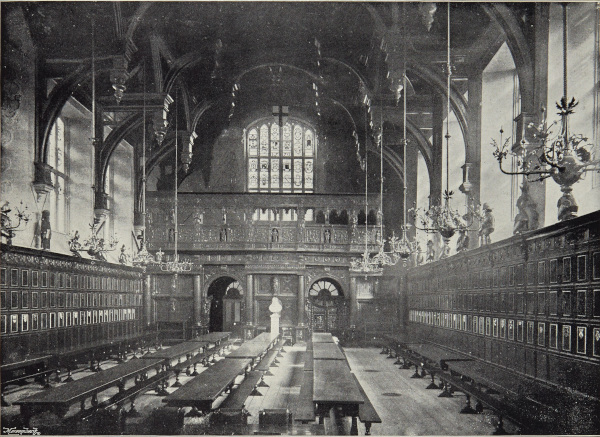
Interior of Middle Temple Hall, 1896 (MT/19/ILL/D/D2/8)
The first known revival performance of Twelfth Night was on 2 February 1880. This iteration differed from any other in the way it was presented, which was in the form of a public reading by one person, Mr S. Brandram, in a similar manner to Charles Dickens’ public recitations of his novels. The reading was complemented by music provided by Miss de Fonblanque and Miss Ada de Fonblanque, possibly sisters, Mr S. Brandram himself, and the Temple Church Choir. After the reading the audience were entertained with ‘glees’ from Shakespeare’s plays, a form of music involving three or more unaccompanied solo male voices including a countertenor.
Programme for a reading of Twelfth Night, 2 February 1880 (GD/44)
There were some very eminent individuals at the 1880 performance including the Duke of Cambridge, a cousin of Queen Victoria, and the Duke and Duchess of Teck, parents of the as then unmarried future Queen Mary. The new roadway to the embankment was made available for the use of carriages, attendees were served with tea, coffee, and ices between acts and supper was served to visitors and Benchers in the Parliament Chamber. The evening was considered a great success and recited by the actors without reference to notes with ‘consummate ability, wonderful memory and great dramatic power’.
Seating plan of a reading of Twelfth Night, 2 February 1880 (GD/44)
The first request to perform Twelfth Night as a play instead of a reading was in 1891 when Miss Elizabeth Robins and Miss Marion Lea lobbied the Benchers to be allowed the use of the Hall for their revival of the play. Miss Robins wrote to the Under Treasurer on 20 November 1891 requesting the use of the Hall with her stated desire for the venue being based partly on the apocryphal tale that Queen Elizabeth I was present for the first performance of the play and danced with Sir Walter Raleigh. Her application was initially rejected on 12 December; however, the idea was believed by the newspapers to have been supported by the Lord Chief Justice and Sir Frederick Pollock. A letter within the Archive from Amelia Pollock, possibly the wife of one of Sir Frederick Pollock’s father’s twenty-three siblings, shows that she may have been the driving force behind the move instead. It was reported in the papers on the 12 January 1892 that the performance would be going ahead, played ‘exactly as in the Poet’s life-time, i.e., without scenery, and with a stage bestrewn with rushes’ and the The Illustrated Sporting and Dramatic News cheekily remarked that ‘The worthy benchers must now expect to be inundated with applications from pretty professionals anxious to secure cheap and dignified pitches for their entertainments. This is perhaps what the old gentlemen in question desire’. However, no retrospective reporting on the play has been found in contemporary newspapers and further evidence relating to the production has not been discovered in the Inn’s records, casting doubt on whether this performance went ahead.
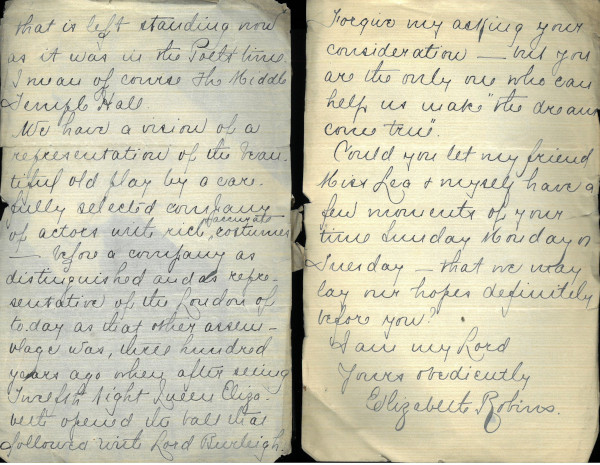
Letter from Miss Elizabeth Robins to the Treasurer requesting use of the Hall as a venue for a production of Twelfth Night, 21 November 1891 (MT/21/1/20/4/3)
The first record within the Inn's Archive of a revival was on 10 February 1897, which was the year of Queen Victoria’s Diamond Jubilee. It was produced by the Elizabethan Stage Society; founded in 1894, the emphasis of this company was on producing plays of the Elizabethan and Jacobean period free from modern scenery and staging, with an amateur cast and with an emphasis on the poetry of the plays. Middle Temple Hall was an ideal venue for this type of theatre company. The entertainment was performed before the Prince of Wales and was well received with Miss Dobie, in the role of Viola, particularly praised as having the ability to ‘give an excellent lesson in elocution, clearness of utterance, and cultured reading of Shakespeare’s text to very many professional actresses’. Despite general praise, the performance ended in a peculiar way even to the mind of the contemporary audience – with the cast going down on their knees before the Prince of Wales and saying a prayer for the Queen taken from the 16th century play Ralph Roister Doister.
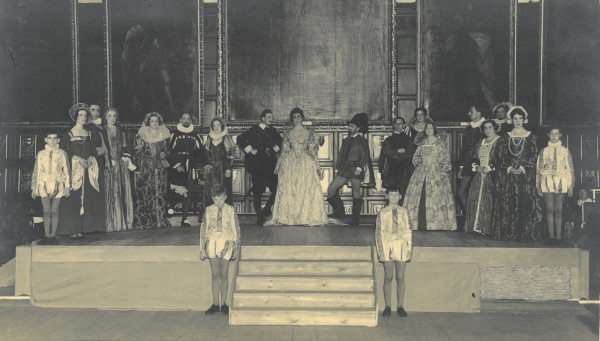
Photograph of the full cast of a production of Twelfth Night held in Middle Temple Hall, 10 February 1897 (MT/19/PHO/2/1)
The next known performance of Twelfth Night took place to raise charitable funds for the Red Cross in 1916. Only select scenes were acted from the work as well as sections of Much Ado About Nothing. These performances formed part of a fete, in the Hall and grounds of the Middle Temple, which also included Elizabethan songs, dance and music by the bands of the Coldstream and Grenadier Guards. However, although held in July the fete fell victim to the unfortunate unpredictability of the English weather, with The Hendon and Finchley Times reporting a ‘dull steady rain that is worthy of late October and early November for its discomfort and dreariness’ and that ‘there is something altogether incongruous in hoops and Elizabethan ruffs when they have to be worn to the accompaniment of umbrellas’. Despite the wet weather, the indoor portion of the fete, which included the play, was enthusiastically received and spirits were brightened by the presence of King George V and Queen Mary.
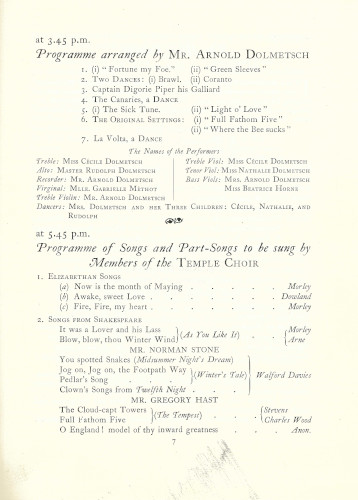
Programme and illustrated souvenir brochure for the Red Cross fete, 1916 (MT/7/EVE/4/7)
In 1934 the play was once again performed by the Holywell Players, an amateur society who ‘by choice of plays or their settings they try to give their audiences something more than an inferior reproduction of a professional west-end performance’; it is interesting to note that this and all previous revivals of the play were performed by amateurs, which may have been considered more respectable to the sensibilities of the Benchers in the late nineteenth and early twentieth centuries. The performance included period music on the virginals, viol da gamba, recorder and violin, and costumes were made by the Central School of Arts and Crafts, which later merged with other institutions to become part of Central Saint Martins College of Arts and Design. The occasion was praised in The Times as ‘one of those satisfying evenings, which are so rare, which leave an impression of a rounded work of art, environment, and play inextricably mingled, each heightening the other’s effect’.
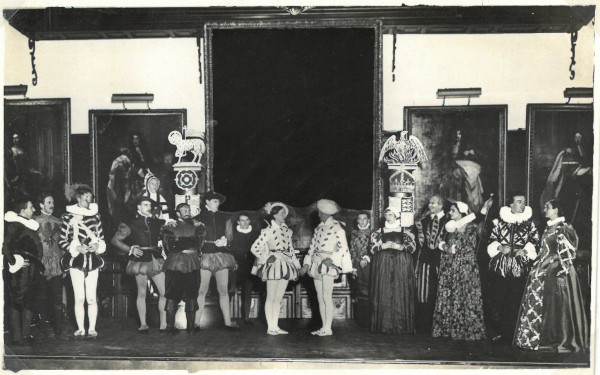
Photograph of the cast of a production of Twelfth Night performed by the Holywell Players, 1934 (MT/19/PHO/2/3/5)
In 1951, the 350th anniversary of Twelfth Night’s first performance in Hall was celebrated (a year early) at the request of the Inn’s Royal Bencher, Queen Elizabeth, with tickets obtainable only by the membership. The event was well covered by the press who were keen to further sensationalise the production by repeating apocryphal claims about the history of the Inn, with one reporter stating that the dais that formed the stage was made of Sir Francis Drake’s Golden Hind – in reality, it is a table that is thought to be made from part of this ship. The play was also notable for being produced by Donald Wolfit, who was well known for his touring wartime productions of Shakespeare; his theatre company, Advance Players Association Ltd., performed in London during the Battle of Britain. He was granted a KBE for his services to theatre in 1950 and knighted in 1957. Mr Wolfit played the role of Malvolio in the Middle Temple production and period music was provided by the Dolmetch Ensemble.
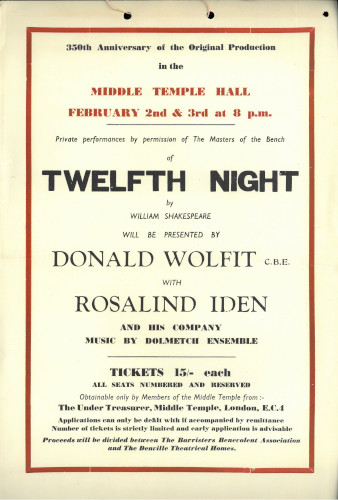
Poster advertising the 350th Anniversary performances of Twelfth Night in Middle Temple Hall, 2-3 February 1951 (MT/7/ROY/7/15)
The 1951 production was attended by both the Queen Elizabeth, later known as Queen Elizabeth, The Queen Mother, and Princess Margaret, who ‘enjoyed the performance of Twelfth Night’ and ‘was thrilled to visit the Middle Temple and see for herself the beauties of which she had heard so much from The Queen’. Queen Elizabeth herself felt that it was a ‘real joy to see Twelfth Night acted in such a setting’. A buffet supper was supplied to the Masters of the Bench and their guests in the Parliament Chamber and Queen’s Room afterwards, with the Smoking Room (now the Prince’s Room), being reserved for the Queen and her party, past Treasurers and their guests. ‘God Save the King’ was played when the Queen arrived at her seat in Hall and Mr Wolfit and the cast were later presented to Her Majesty. The proceeds of the evening were allocated equally between the Barristers’ Benevolent Association and the Denville Home for Aged Actors and Actresses.
Seating plan for the 350th Anniversary performance of Twelfth Night, 2 February 1951 (MT/7/ROY/7/15)
In 1964 a performance of Twelfth Night took place in Hall as part of the Festival of the City of London, which coincided with the quatercentenary of Shakespeare’s birth in 1564. The organisers wrote to the Middle Temple requesting public performances with the New Shakespeare Company performing the play, which was approved - this contrasts with previous performances that were only open to the membership. Once again it was performed before Queen Elizabeth, the Queen Mother, and was reviewed in The Stage, who stated ‘no point is over-stressed, the audience being treated as intelligent beings capable of appreciating witty lyrics and verbal or visual jokes which are not necessarily obvious. The direction was noted as fast paced, the choreography inventive, the music ‘brisk and tuneful’ and the setting of fretwork cut-outs ‘serving a multitude of purposes admirably,’.
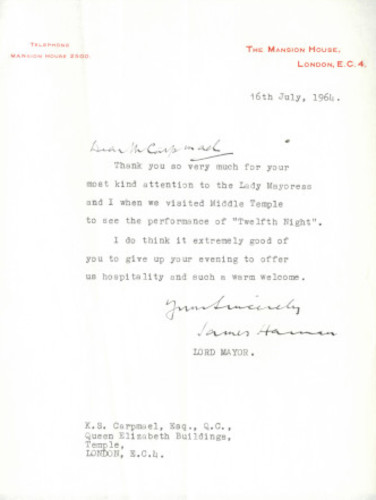
Letter of thanks from Sir James Harman, the Lord Mayor of the City of London, regarding his visit to the Middle Temple to see Twelfth Night, 16 July 1964 (MT/7/ROY/7/33)
Another performance of the play was staged in Hall in 1970 by the Oxford and Cambridge Shakespeare Company, another amateur company, at which the Queen Mother was once again in attendance. It was staged as part of the quatercentenary celebrations of the construction of Middle Temple Hall, but there is very little information within the Archive about the particulars of this production. It appeared to attract very little press fanfare in comparison with previous iterations and very few column inches were dedicated to the details of the evening. However, the production later went on tour in the US and Canada where it was savaged by the New York Times theatre critic Clive Barnes, who declared that it should not have been put in front of a serious critic.
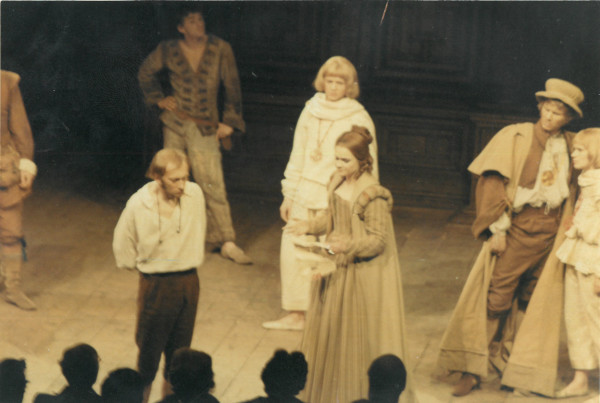
Photograph of a performance of Twelfth Night in Middle Temple Hall by the Oxford and Cambridge Shakespeare Company, 1970 (MT/19/PHO/2/7/5)
The next production of Twelfth Night was one of the most notable, being performed on 2 February 2002 to celebrate the quatercentenary of the play’s first known performance in Middle Temple Hall with further performances following this ‘gala revel’. Plans for this production were set into motion from as early as 1994 and due to the special nature of the celebration, Mark Rylance of Shakespeare’s Globe, later made an Honorary Bencher, was asked to produce the play. It was staged differently to previous iterations – instead of placing a stage on the dais with the audience facing the west wall, the audience was placed in a horseshoe shape around the Hall facing the screen. It was also more faithful to the original staging in the choice to have the female roles played by men, which revived the long-forgotten spirit of Tudor Christmas. The act of crossdressing by sixteenth century actors - also prevalent in the character of Viola, who disguises herself as her twin brother throughout the play - fed into the medieval and early modern Christmas themes of misrule and upending rigid social conventions, and the 2002 revival was the first subsequent version that touched on this.
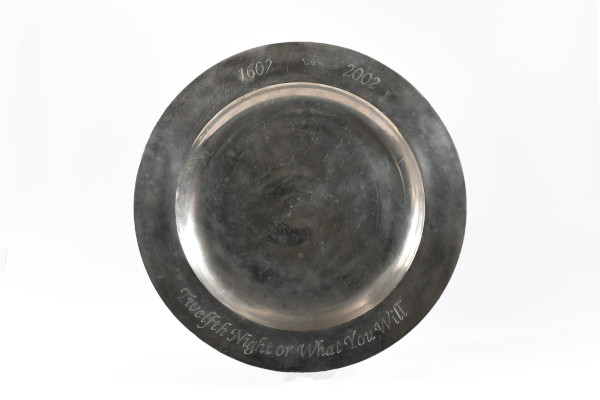
An inscribed pewter Charger presented to the Middle Temple by Shakespeare’s Globe to commemorate their Quatercentenary performance, 2002
Since renewed interest in Shakespeare in the nineteenth century, a great many versions of Twelfth Night have played in Middle Temple Hall. These productions have differed in form and character, with varying degrees of faithfulness to the original staging. However, each version carried to its audience the echo of the Candlemas Feast over four hundred years ago when the voices of Shakespeare’s own company of actors, the Lord Chamberlain’s Men, rang through the rafters of Hall.